Türkiye
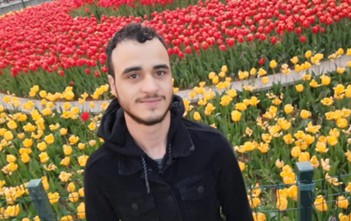
Ahmad Aabo; Good news
On 8 August I sent you an Urgent Action concerning Syrian asylum seeker Ahmad Aabo, who has lived in Türkiye since 2012, but had his temporary protection status revoked in 2023 after being diagnosed with HIV and assigned a security code on grounds that ‘he carries a communicable disease’.
In 2024, Ahmad Aabo was detained in two separate deportation centres in Istanbul and Adana for six months and faced the threat of being returned to Syria. He reported cruel, inhumane or degrading treatment while in detention. In October 2024, he was released from detention after the removal of the security code and lifting of the deportation order, but his temporary protection status was not restored. After his release, he lived in constant fear of being detained again. In May 2025, he was again detained and placed at the Arnavutköy deportation centre for three days after a random police ID check in the street.
Following the Amnesty International’s urgent action published on 4 August 2025, Ahmad Aabo was invited to the office of the Istanbul Migration Management Directorate on 26 August, where his temporary protection status was restored and an ID card was issued for him. As a result of this, his access to free healthcare was also restored after the social security was reactivated. After almost two years of living in uncertainty, the positive impact of the urgent action on the Presidency of Migration Management is very clear.
Speaking to Amnesty International, Ahmad Aabo said:
“The urgent action appeal helped me breathe again. I want to send my sincere gratitude to everyone. Simply because of my HIV+ status, I endured persecution, I was detained. I feared being detained every time I saw a police officer. I have my ID card again, I regained my rights. This is the impact of the urgent action. Thanking you is not enough. I wish that no one goes through what I have been through. HIV is not an illness. People living with HIV should be supported. They should not endure torture. I thank all those who signed appeals for me, all those who stood by me from the bottom of my heart.”
MANY THANKS TO ALL WHO SENT APPEALS ON BEHALF OF AHMAD
Human rights defender arrested following speech at Council of Europe’s Congress of Local and Regional Authorities
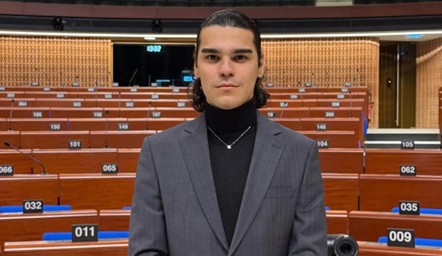
Human rights defender Enes Hocaoğulları was placed in arbitrary pre-trial detention on 5 August after being detained at Ankara Esenboğa Airport upon his return to Türkiye from a Council of Europe conference in Strasbourg. He is charged with ‘publicly disseminating misleading information’ and ‘inciting the public to hatred and enmity’ under an indictment dated 8 August. The charges are based solely on a short speech he delivered on 27 March at the 48th session of the Council of Europe’s Congress of Local and Regional Authorities, where he spoke about rights violations during mass protests following the detention the Istanbul Mayor Ekrem İmamoğlu in the previous week.
Amnesty is calling for him to be immediately and unconditionally released. No one should be prosecuted for peacefully exercising their right to freedom of expression and speaking out against human rights violations. Please write to the Ankara Chief Public Prosecutor using this letter our group sent. Or go to the AIUK Urgent Action and email.
June 2025 Refugee Week
 During this year’s Refugee Week, we held an event at North Kensington Library to hear about various refugees, safe routes and what needs to be done in Europe to ensure a more compassionate asylum system. Thank you to our speakers, Lucja Jastrzebska (Amnesty UK Country Coordinator for Central Europe), Ulrika Schmidt (Amnesty UK Country Coordinator for the Balkans), Aria Danaparamita (Mita, Independent researcher and director of the short film Dover 82) and Chiara Fabbro (documentary photographer).
During this year’s Refugee Week, we held an event at North Kensington Library to hear about various refugees, safe routes and what needs to be done in Europe to ensure a more compassionate asylum system. Thank you to our speakers, Lucja Jastrzebska (Amnesty UK Country Coordinator for Central Europe), Ulrika Schmidt (Amnesty UK Country Coordinator for the Balkans), Aria Danaparamita (Mita, Independent researcher and director of the short film Dover 82) and Chiara Fabbro (documentary photographer).
Poland
Afghan asylum seekers awarded compensation for mistreatment by Polish border guards
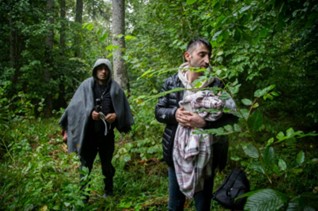 Two Afghan asylum seekers who irregularly crossed the border from Belarus into Poland have each been awarded 5,000 zloty (€1,177) compensation for their mistreatment by Polish border guards.
Two Afghan asylum seekers who irregularly crossed the border from Belarus into Poland have each been awarded 5,000 zloty (€1,177) compensation for their mistreatment by Polish border guards.
The two Afghans encountered a Polish border guard patrol after crossing from Belarus and requested refugee status, reports the Gazeta Wyborcza daily. They were initially taken to a border guard station but then driven back towards the border at night and left in a marshy area in Białowieża Forest.
Doctors found guilty over death of pregnant woman in Poland
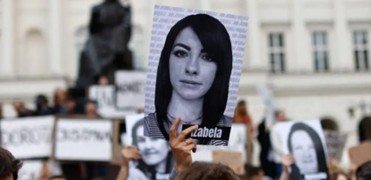 Three doctors in Poland have been found guilty in connection with the death of a pregnant woman, in a case that has been linked to the tightening of the country’s already strict abortion laws.
Three doctors in Poland have been found guilty in connection with the death of a pregnant woman, in a case that has been linked to the tightening of the country’s already strict abortion laws.
The woman, identified only by her first name, Izabela, died of sepsis in 2021 when she was 22 weeks into her pregnancy, which had complications. Izabela’s death led to nationwide protests under the slogan “Not One More” and her face has become a symbol of the fight for broader access to legal abortion.
Read more: www.bbc.co.uk/news/articles/c1lj145jy5zo
Hungary
World was watching as tens of thousands marched in defiance of attempted ban on Budapest Pride
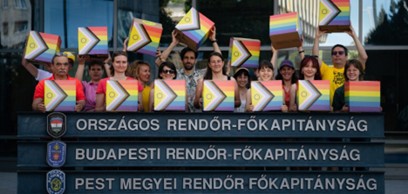 On 28 June, Budapest Pride went ahead despite restrictive anti- Pride legislation and police efforts to prevent the march. In April, discriminatory legislation came into force that could be used to ban Pride marches and other protests supporting equal rights of LGBTI people in Hungary. Authorities declared the Budapest Pride illegal, yet thousands, including over 280 Amnesty International activists and staff (including Sacha Deshmukh and Agnes Callamard), from Hungary and other 22 countries, nonetheless came together with thousands of others to peacefully demand equality, freedom of assembly, and human rights.
On 28 June, Budapest Pride went ahead despite restrictive anti- Pride legislation and police efforts to prevent the march. In April, discriminatory legislation came into force that could be used to ban Pride marches and other protests supporting equal rights of LGBTI people in Hungary. Authorities declared the Budapest Pride illegal, yet thousands, including over 280 Amnesty International activists and staff (including Sacha Deshmukh and Agnes Callamard), from Hungary and other 22 countries, nonetheless came together with thousands of others to peacefully demand equality, freedom of assembly, and human rights.
This was the largest march in Budapest Pride’s history. Its success, despite authorities’ opposition, demonstrated the strength and resilience of Hungary’s LGBTI community and its allies. This outcome was achieved through the combined efforts of many, including Amnesty International’s Let Pride March campaign, which helped raise awareness, mobilize activists, and called on the Budapest police to respect the right to peaceful protest. Amnesty supporters worldwide sent letters, signed petitions, and shared information- support local activists recognized as vital. A total of over 120,000 actions were collected from across 73 countries and were delivered on 25 June by Amnesty Hungary staff and activists to the Budapest police. While challenges remain for LGBTI rights in Hungary, including the anti-Pride legislation and potential fines for Pride march participants and criminal sanctions for organisers this event proved that collective action and solidarity can overcome attempts to silence calls for equality. Amnesty will continue to monitor and support Hungary’s LGBTI community.
Serbia
Authorities must end unlawful use of force against protesters and investigate reports of police violence. read here
Following reports of a widespread violent crackdown on largely peaceful student protesters in Belgrade and other major towns across Serbia for the sixth consecutive day since 28 June, when student movement called for an early parliamentary election, Amnesty International and Civil Rights Defenders said in a joint statement:
“Footage of Serbian riot police indiscriminately targeting peaceful protesters gathered at blockades on the street and in front of universities in Belgrade is alarming. There have been widespread arrests and allegations of excessive or otherwise unlawful use of force against student protesters – during the protests, the arrests and in police custody. Authorities must urgently investigate and explain reports of masked individuals in civilian clothes targeting protesters”.
Background
July saw an increasing crackdown against largely peaceful civic actions after student protesters called for early parliamentary elections and set up hundreds of road blockades in multiple towns across the country. Amnesty International received reports about several hundred students, including high school students, and other protesters arrested on various criminal and administrative charges since Sunday.
While many have been released, there were reports about police using excessive force both during the protests, arrests and detention, including beatings which left several students hospitalized for injuries.
Tens of thousands of people took to the streets of the Serbian capital Belgrade demanding early parliamentary elections. The Saturday protest was the last in nearly eight months of persistent demonstrations across Serbia, triggered by the collapse of the railway station in Novi Sad in November 2024, which killed 16 people and sparked allegations about negligence and corruption in government infrastructure projects.
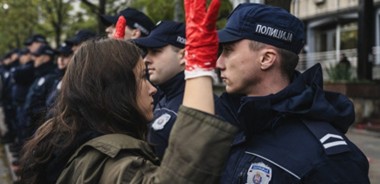 Serbian Diaspora in the UK actions
Serbian Diaspora in the UK actions
The Serbian diaspora in the UK represented by Serbian students in the UK gathered around the civic group ’’UK uz studente’’ has been calling activists to join them in the campaign of sending letters to local MPs.
Their campaign is called ’’Wake Up Westminster’’ and they hope to raise awareness in the UK about police brutality, violence against civil society and corruption in Serbia. Find out more here.
Human Rights under attack across the whole of Europe
Human Rights are under increasing attack in Europe. In the UK hard won achievements on recognition of Universal Human Rights including the Right to seek asylum from persecution are under attack. Mob violence instigated by far-right actors and organisations like the fascist Homeland, Patriotic Alternative, Combat18 and ex BNP activists. I supported a small community gathering in Epping yesterday, with residents of colour telling me that they are too scared to leave their house on their own. Stand up to Racism groups have been challenging the far right and their local racist followers across the country but we need a far larger coalition of people believing in equality and universal human rights to challenge this dangerous backlash. The government is not helping. Instead of challenging the undermining of the British values of tolerance and inclusion, our Prime Minister joins in with the scapegoating and sells out migrant communities who have built this country, staffing the NHS, care sector, Education and many other vital industries and services by talking about an “Island of strangers”. The effect is an emboldening of the far right and closeted racists who are now proudly threatening refugees and asylum seekers, people and organisations that support refugees and asylum-seekers and settled ethnic minorities.
It is time to stand up!
Instead of defending vulnerable communities and human rights defenders in the UK, the government is criminalising peaceful protesters. Palestine Action is a nonviolent organisation, that has been proscribed as “terrorist” for spraying paint on airplanes. Hundreds of peaceful protesters, including a 93 year old Jewish woman, have been manhandled and arrested for holding placards saying “I oppose Genocide, I support Palestine Action”.
Please take Action about the criminalisation of peaceful protest in the UK
END PROSECUTION OF PEACEFUL PROTESTORS
On 9 August, 522 protestors were arrested in London, with more than 200 others arrested for similar offences in London and across the UK on previous weekends, for peacefully opposing the ban introduced on 5 July, against ‘Palestine Action’. 70 have since been charged with terrorism-related offences under the UK’s counter terror legislation and more charges are threatened.
Amnesty International condemns the use of this legislation against protestors and is calling on the relevant authorities across all UK legal jurisdictions to drop the existing charges and to take no further action against these and any other individuals arrested and charged simply for the exercise of their rights to freedom of expression and peaceful assembly.
WRITE AN APPEAL IN YOUR OWN WORDS OR USE THIS MODEL LETTER. This is also an ONLINE ACTION
Director of Public Prosecutions of England and Wales, Steven Parkinson Email: enquiries@cps.gov.uk
Director of Public Prosecutions for Northern Ireland, Stephen Herron Email: info@ppsni.gov.uk
The Lord Advocate, Rt Hon Dorothy Bain KC Email: LordAdvocate@gov.scot
Dear Directors of Public Prosecutions for England and Wales, Northern Ireland and Lord Advocate,
I am writing to express deep concern at the arrests and potential prosecutions of over 700 individuals peacefully protesting the UK government’s recent proscription of ‘Palestine Action’.
Since the ban against ‘Palestine Action’ came into effect on 5 July, over 700 people have been arrested across the country for their engagement in acts of peaceful protest opposing the proscription. The majority of these arrests have followed protests organised by Defend Our Juries (DOJ), a grassroots campaigning group, where people have held placards with the slogan, “I oppose genocide, I support Palestine Action”. 522 of the over 700 arrests were carried out on 9 August alone, when DOJ held a civil disobedience protest in London, in front of Parliament. All have since been released under investigation or on bail. As of 22 August, 70 individuals across the UK have been formally charged with terror related offences, under either section 12 or section 13 of the UK’s 2000 Terrorism Act, with three individuals, at the time of writing, known to be appearing in court on 16 September.
Defend our Juries’ next protest is due to take place on 6 September, with fears that more arrests are likely to be carried out.
Numerous human rights groups, including Amnesty International, have documented and exposed extensively Israel’s continuing genocide against Palestinians in the Occupied Gaza Strip.
Under international human rights law, to which the UK is bound, any restriction on the rights to freedom of expression and peaceful assembly must be lawful, necessary and proportionate to achieving a legitimate aim. Criminalising speech in this context is only permitted when it incites violence or advocates hatred or discrimination. Expressing support for Palestine Action does not, in itself, meet this threshold. The European Court of Human Rights’ case law confirms that such expressions, including those on placards, remain protected speech unless they directly and expressly incite violence. Arresting and prosecuting individuals in this context is a violation of the UK’s obligations under human rights law.
I urge you to uphold UK’s human rights commitments and drop the charges and not pursue prosecutions against all those who participated in peaceful protests in support of ‘Palestine Action’.
Yours sincerely,
Additional information:
’Defend our Juries’ is an activist-led, UK-based group that has made clear it neither promotes nor endorses violence. The arrested protesters come from a wide range of ages, professions and backgrounds, and a significant number of older adults.
Protesters are peacefully expressing their outrage at Israel’s ongoing genocide against Palestinians in Gaza, a viewpoint they are entitled to hold and express peacefully under international human rights law. Numerous human rights groups, including Amnesty International, have documented and exposed extensively Israel’s continuing genocide against Palestinians in the Occupied Gaza Strip.
Prior to the 9 August London protest, Amnesty International urged the London Metropolitan Police Commissioner to respect the protesters’ rights to freedom of expression and peaceful assembly by not arresting them for holding placards/signs. Amnesty International has written similarly to police chiefs in Scotland and Northern Ireland and Scotland’s Lord Advocate.
Prosecutions under terrorism-related legislation, even without a conviction, can have serious and lasting consequences on individuals. These include restrictive bail conditions, surveillance, reputational damage, mental health impact, and negative consequences on employment, education and travel. A conviction under laws like the Terrorism Act 2000 brings even more severe consequences: a lifelong criminal record, visa and immigration issues, loss of job opportunities, professional licenses, and access to services, along with long-term social stigma and psychological harm. When such prosecutions target peaceful protest and civil disobedience, they create a chilling effect—deterring people from exercising their rights to free expression, protest, and political activism out of fear of being criminalized as ‘terrorists’.
The arrests of peaceful protesters simply for displaying the message ‘I Oppose Genocide. I Support Palestine Action’ violates UK’s international obligations to protect freedom of expression and peaceful assembly. Protesters have a right to peacefully express outrage at the ongoing genocide by Israel against Palestinians in Gaza. Under the international human rights framework to which the UK is a party, state interference with expression and peaceful assembly must be lawful, and a necessary and proportionate means of achieving a legitimate aim. Expression of support for a proscribed organisation could only meet this threshold, if that expression were likely to induce its audience to partake in violence, and to do so imminently. As part of this assessment, the particular facts of the expression, the proscription and the nature of the organisation in question must also be considered. In this instance, it cannot be justified to treat expression of support for Palestine Action as inherently and uniformly incitement. Caselaw by the European Court for Human Rights stated that placards are protected speech unless they directly and expressly constitute incitement.
The legal basis for the use of terrorism-related legislation to carry out the arrests and initiate prosecutions against peaceful protesters is questionable as the High Court has allowed Palestine Action to seek judicial review of their proscription, suggesting it may be unlawful. Given this, continuing arrests would be a reckless use of police power, and inevitably risk breaching the test of legality. There is no reasonable basis to consider participants at ‘Defend our Juries’ actions as inciting violence.
Consequently, arresting them is both disproportionate and a clear violation of the UK’s obligations under international human rights law. Furthermore, categorising such individuals as ‘terrorists’ is deeply inappropriate and absurd.
PLEASE TAKE ACTION AS SOON AS POSSIBLE
Greece
Tightening of Asylum Procedures
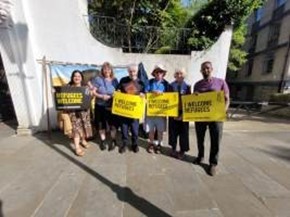 Around Europe governments are implementing tighter and tighter restrictions on people seeking asylum. This June during Refugee Week we assembled again outside the Embassy of Greece to commemorate the over 600 people who drowned when the rickety trawler they travelled on capsized after being violently towed by a patrol boat of the Greek coastguard. While finally court proceedings against the crew and 2 senior officers in the control room have started, Greece is planning to further tighten access to asylum procedures.
Around Europe governments are implementing tighter and tighter restrictions on people seeking asylum. This June during Refugee Week we assembled again outside the Embassy of Greece to commemorate the over 600 people who drowned when the rickety trawler they travelled on capsized after being violently towed by a patrol boat of the Greek coastguard. While finally court proceedings against the crew and 2 senior officers in the control room have started, Greece is planning to further tighten access to asylum procedures.
www.amnesty.org/en/documents/eur25/0204/2025/en/
FROM THE EUROPE TEAM
Türkiye : Chris Ramsey
Central Europe: Lucja Jastrzebska
Western and Northern Europe: Jovana Bosnjak
South East Europe: Ulrike Schmidt
Don’t forget to follow us for campaigns, actions and news on social media: